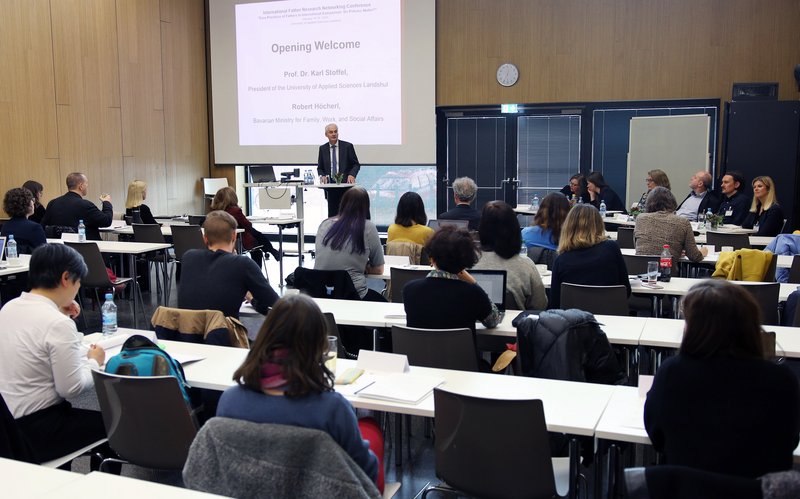Around 60 participants from over 20 countries and 13 fascinating presentations - this was the outcome of the International Conference, “Care Practices of Fathers in International Comparison: Do Policies Matter?”, which was held with the support of the German Research Foundation (DFG) from 16 to 18 January at Landshut University of Applied Sciences.
“It took over two and a half years and countless Skype conversations to organise the conference,” explained Professor Dr. Barbara Thiessen, Head of the Institute for Social Change and Cohesion Research at Landshut University of Applied Sciences. The organising team also included Professor PhD Marina Adler (University of Maryland, Baltimore County), Professor Dr. Karl Lenz and Dr. Tino Schlinzig (both TU Dresden), Kathrin Peltz (Landshut University of Applied Sciences) and Dr. Claudia Zerle-Elsäßer (German Youth Institute, Munich).
University President, Professor Dr. Karl Stoffel, and Robert Höcherl, Permanent Secretary to the Bavarian State Ministry for Families, Labour and Social Affairs, officially opened the conference. Stoffel welcomed the many experts in the field of Father Research and highlighted the importance of the Faculty of Social Work, which has played a key role in shaping the research and teaching at Landshut University of Applied Sciences since it was established in 1978.
Father research examines questions that are relevant to the future of modern societies
Over the course of three days, the “International Father Research Networking Conference” looked at the connection between everyday care practices of fathers and gender-related welfare state structures in the context of fatherhood policies. The aim was to bring together experts in father research from all over the world for an intensive exchange of ideas and experiences.
This was a success: speakers from China, Germany, Great Britain, Iceland, Lithuania, Norway, Austria, Sweden, Slovenia, Spain, Hungary and the USA presented their current research findings and discussed them with participants from three continents.
On the one hand, the symposium facilitated the presentation of the current status of research in international contexts whilst on the other it enabled the formation of research networks and cooperations with a view to closing existing research gaps. In comparing countries on an international, social policy level, it became clear that those countries that specifically provide for parental leave for fathers have been able to achieve great progress in terms of paternal involvement in families. Where conservative or neoreactionary governments have limited or abolished these rules, the involvement of fathers with their families reduced dramatically in a short period of time. At the same time, on an international scale it is evident that families are more stable and more supportive for children if mothers are more economically active and, conversely, fathers are more active in the family.
A significant outcome of the conference is the establishment of a Father Research Network in which the successful international cooperation will be carried forward.
Photos: Landshut University of Applied Sciences
(free to use provided the source is indicated)

